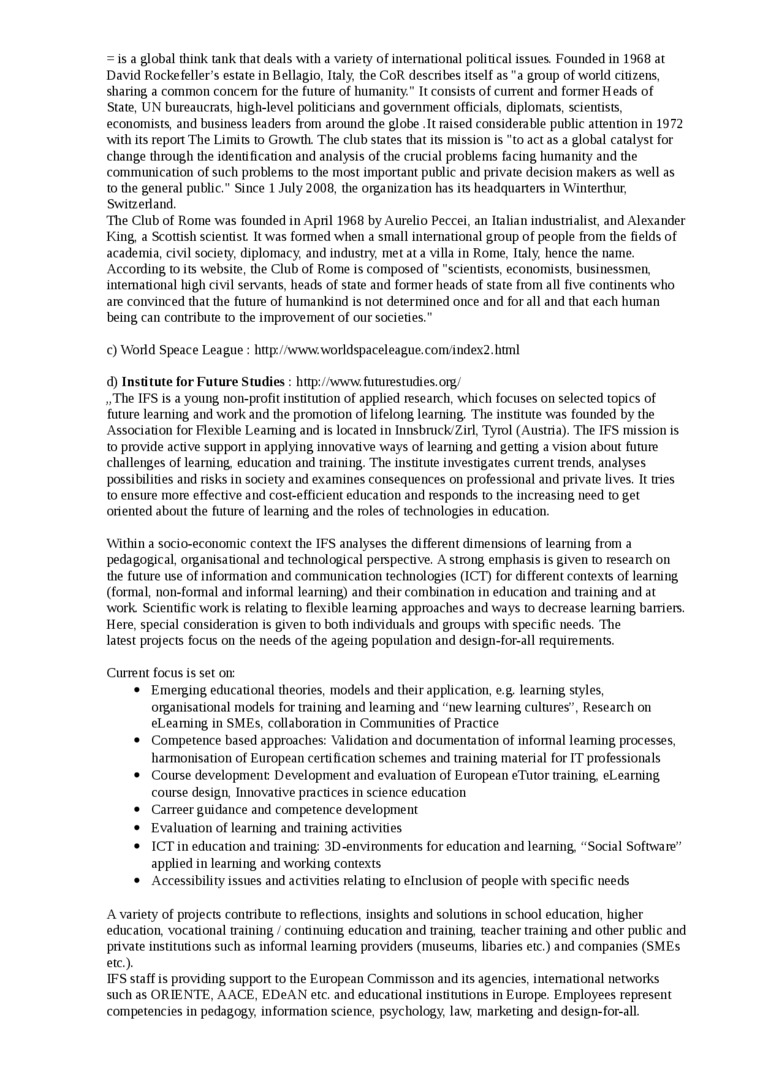103428

= is a global tliink tank tliat deals with a variety of intemational polidcal issues. Founded in 1968 at David Rockefeller^ estate in Bellagio, Italy, the CoR describes itself as "a group of world citizens, sharing a common concem for the futurę of humanity." It consists of current and former Heads of State, UN bureaucrats. high-level politicians and government officials, diplomats, scientists, economists, and business leaders from around tlie globe .It raised considerable public attention in 1972 with its report The Limits to Growth. The club States tliat its mission is "to act as a global catalyst for change tiirough the identi fication and analysis of the crucial problems facing humanity and the communication of such problems to tlie most important public and private decision makers as well as to the generał public." Since 1 July 2008. the otganizańon has its headquarters in Winterthur, Switzerland.
Tlie Club of Romę was founded in April 1968 by Aurelio Peccei, an Italian industrialist, and Alexander King, a Scottish scientisL It was foimed when a smali intemational group of people from tlie fields of academia, civil society, diplomacy, and industry, met at a villa in Ronie, Italy, hence tlie name. According to its website, the Club of Romę is composed of "scientists, economists, businessmen. intemational high civil servants, heads of State and former heads of State from all five continents w ho are convinced that tlie futurę of humankind is not determined once and for all and tliat each human being can contribute to tlie improvement of our societies."
c) World Speace League: http://www.worldspaceleague.com/index2.html
d) Institutę for Futurę Studies : http://www.fumrestudies.org/
„Tlie IFS is a young non-profit institution of applied research, which focuses on selected topics of futurę leaming and work and tlie promotion of lifelong learning. The institute was founded by the Association for Flexible Leaming and is located in Innsbmck/Zirl, Tyrol (Austria). The IFS mission is to provide active support in applying innovative ways of learning and getting a vision about futurę challenges of leaming, education and training. The institute investigates current trends, analyses possibilities and risks in society and examines consequences on professional and private lives. It tries to ensure morę effective and cost-efficient education and responds to the increasing need to get oriented about tlie futurę of leaming and the roles of technologies in education.
Within a socio-economic context the IFS analyses tlie different dimensions of leaming from a pedagogical, oiganisational and technological perspective. Astrong emphasis is given to research on the futurę use of information and communication technologies (ICT) for different contexts of leaming (forma), non-fotmal and informal learning) and their combi nań on in education and training and at work. Scienńfic work is relating to flexible leaming approaches and ways to decrease learning barriers. Here, special consideration is given to botli individuals and groups with specific needs. Tlie latest projects focus on tlie needs of the ageing populańon and design-for-all requirements.
Current focus is set on:
• Emeiging educańonal tlieories, models and their applicańon, e.g. leaming styles, oiganisational models for training and leaming and "new leaming cultures”, Research on eLeaming in SMEs, collaborańon in Communińes of Pracńce
• Competence based approaches: Validańon and documentańon of informal leaming processes, harmonisation of European ceni fication schetnes and training materiał for IT professionals
• Course development: Development and evaluation of European eTńtor training eLeaming course design, Innovative pracńces in science education
• Carreer guidance and competence development
• Evaluańon of learning and training activities
• ICT in education and training 3D-environments for education and leaming “Social Software” applied in leaming and working contexts
• Accessibility issues and acńvities relating to elnclusion of people with specific needs
A variety of projects contribute to reflecńons, insights and soluńons in school education, higher education. vocańonal training / conńnuing education and training teacher training and otlier public and private instituńons such as informal leaming providers (museums, libaries etc.) and companies (SMEs etc.).
IFS Staff is providing support to tlie European Commisson and its agencies, intemational networks such as ORIENTE, AACE, EDeAN etc. and educational insńmtions in Europę. Employees represent competencies in pedagogy, information science, psychology, law, marketing and design-for-all.
Wyszukiwarka
Podobne podstrony:
b) The Club of Romę: http://www.clubofrome.org/eng/home/ = is a global think tank
Throughout the passage, Sulekha identifies the hijras’ linguistic behavior with a variety of differe
essent?rving?04 E S S E N T I A L W O O D C A R V I N G T E C H N I Q V E S (Fig 9.20) bur could hav
Chameleon p Chameleon is an extremely ver$atile theme with a myriad of options and styles* Abquam ve
bunker5 The pnncipal adł/antage d this shelter is that il can be erecten with a minimum of excavatio
image002 ‘Barncs has great lun fooling around with a rariety of unexpecte<l_alt£mate universes in
population is morę diverse and used to a vider rangę of entertainments than drinking pints in a pub,
GTID Concepts A global transaction identifier (GTID) is a unique identifier created and associated w
Marta Wiśniewska IS THE CHINESE STOCK MARKET INTEGRATED WITH THE GLOBAL STOCK
DSC09926 GLOBAL HYPOXIC-ISCHEMIC ENCEPHALOPATHY Morphology: the brain is softened and edematous with
239 (10) Finish your gift bags with baker’s twine - it comes in a variety of pretty colours and
skanowanie0066 (3) b) antonymy is a term describing a variety of different forms o
An important number of intemational institutions deals with Production Engineering problems, i.e. Th
więcej podobnych podstron